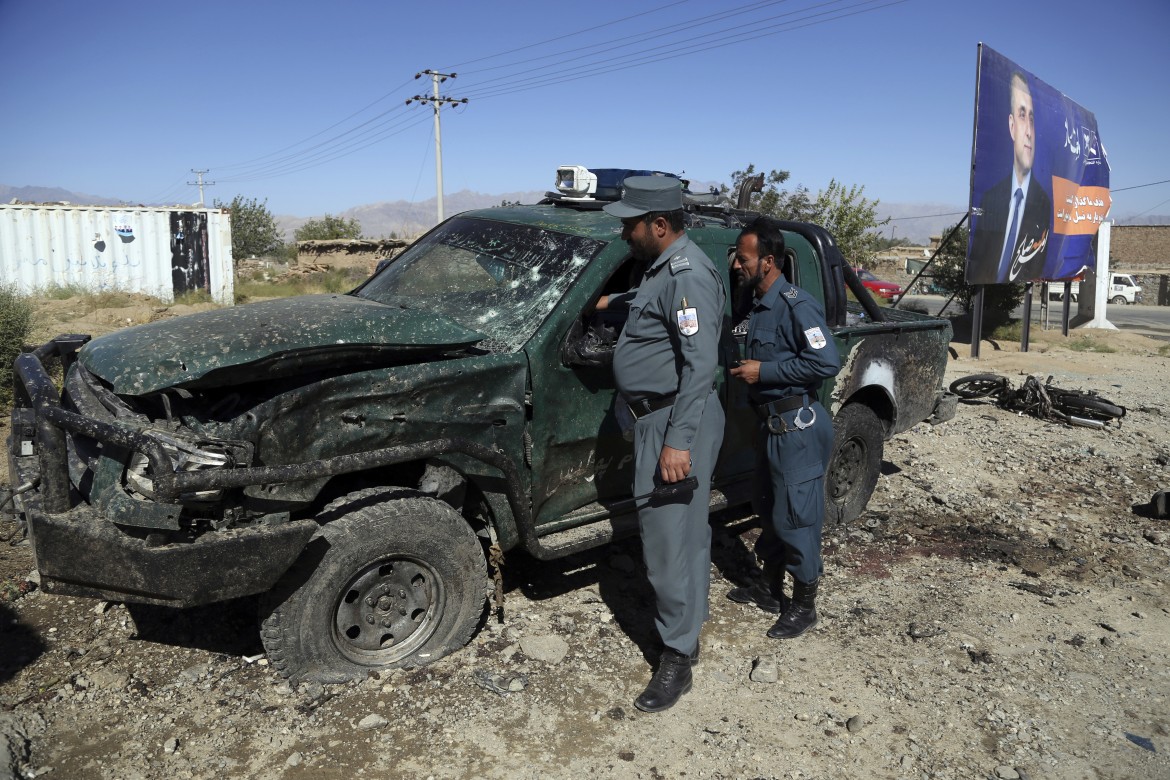Analysis
In twin Afghanistan attacks, two messages for Ghani and Trump
On Tuesday, two Taliban suicide attackers targeted the Afghan president in Parwan and government offices in Kabul, killing 46. The Islamists’ message is clear: no to elections and pressure on the White House after it stopped negotiations.

In the space of 90 minutes on Tuesday, the Taliban perpetrated a double terrorist attack. In Charikar, the capital of Parwan province, they struck one of President Ghani’s campaign rallies in Kabul, and then, shortly afterwards, the Massoud Circle in the city center, close to many government buildings. At least 22 died in Kabul, with another 24 in Parwan and many dozens of wounded.
There was a single strategy behind these two attacks, aiming to send a message to two different recipients. In Charikar, the suicide bomber struck one of the control checkpoints at the entrance of a police training center. Inside were 5,000 people taking part in the campaign rally of President Ashraf Ghani, in one of his rare public appearances, particularly outside Kabul, in the campaign for the presidential elections on Sept. 28.
Until a few days ago, Ghani—who is seeking a second term—had avoided going on the move, instead holding video conferences with voters. Tuesday, he decided to present his agenda in person in Charikar, accompanied by Amrullah Saleh, a former intelligence chief and now his running mate on the presidential ticket.
The bomber failed to prevent the rally, but the message was directed at Ghani himself: in the view of the Taliban, the government in Kabul continues to be illegitimate, and will be seen as even more so in the future if Ghani were to continue to rule it—who is, among other things, at loggerheads with Islamabad, a traditional sponsors of Koranic students.
According to the Taliban, even the elections themselves are illegal and “farcical” in a country still under occupation. They said this several weeks ago, threatening a violent boycott and hinting that the Afghans must not participate.
Until Sept. 7, nobody would have bet that the presidential elections were actually going to take place. The signing of an agreement between the US and Taliban was being taken for granted, which would have probably cancelled the elections. The certainty that they were going to happen came only after Trump blew up the negotiations.
The second message is meant for Trump himself. The Massoud Circles is around a thousand feet away from the enormous US embassy, which has been growing for months. And the province of Parwan, together with Kabul, is one of the two provinces where the ceasefire with the Americans was supposed to go into effect, according to leaks of the text of the prospective deal.
Thus, while they are trying to strengthen relations with regional powers, and without completely foreclosing the path to a possible resumption of the peace talks, the Taliban are sending Trump a message with these twin bombings: namely, that if Washington walks away from the negotiating table, they are ready to fight “for another hundred years,” as a member of their delegation to Doha, Qatar put it.
The Taliban are also willing to suffer the consequences, which also fall on government soldiers, but especially on civilians. According to an investigation by the BBC, August was the worst month yet in the conflict, with an average of 74 deaths per day.
The investigation revealed a number of facts: that among the 2,307 people confirmed dead by the British during in that month alone (with around 2,000 injured), the greatest part was made up of military personnel and militia members, while one-fifth were civilians, with a significant percentage of women and children.
However, among the dead combatants, the most casualties were incurred by none other than the Taliban: as the BBC writes, the guerrillas are the most powerful they’ve been since 2001, “their fighters account for nearly half of all deaths confirmed by the BBC for August—a huge number, which comes as a surprise.”
Several factors might play a role here, including the fact that the Taliban “the Taliban have been on the offensive during peace talks, and US-led forces have increased air strikes and night raids in response, killing many Taliban as well as civilians.” Both the Taliban and the Afghan government have disputed the figures.
The investigation by the BBC only confirms the trend of increasing violence, which recorded very high casualty numbers as early as July, making it the worst month of the year up to that point. However, while August turned out to be even deadlier, with the elections around the corner one can only expect the very worst. Given that the Taliban, the government and their allies were still fighting hard while the negotiations were ongoing, now that the negotiations have broken down, the situation can only worsen on the military level.
At the same time, however, one may wonder whether the failure of the negotiations could have played a role in pushing the judges of the International Criminal Court at The Hague to revise their ruling which rejected the public prosecutor’s request to open an investigation into serious crimes related to the Afghan conflict.
The Court announced Tuesday that they would accept the appeal after all. The proposed investigation was previously rejected because it was judged unlikely to achieve significant results, due to involving a country (the US) which does not recognize the authority of the ICC. Kabul, however, has recognized the authority of the Court.
Originally published at https://ilmanifesto.it/due-attentati-due-destinatari-talebani-contro-ghani-e-trump/ on 2019-09-18
